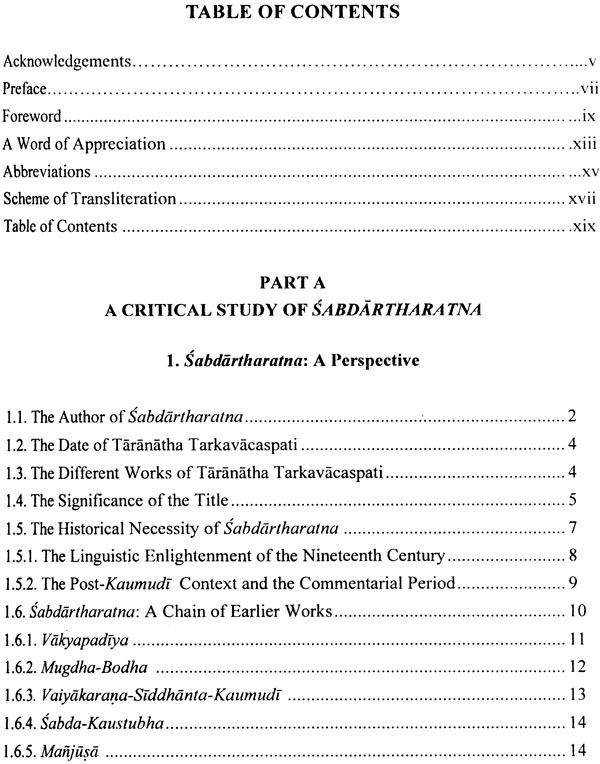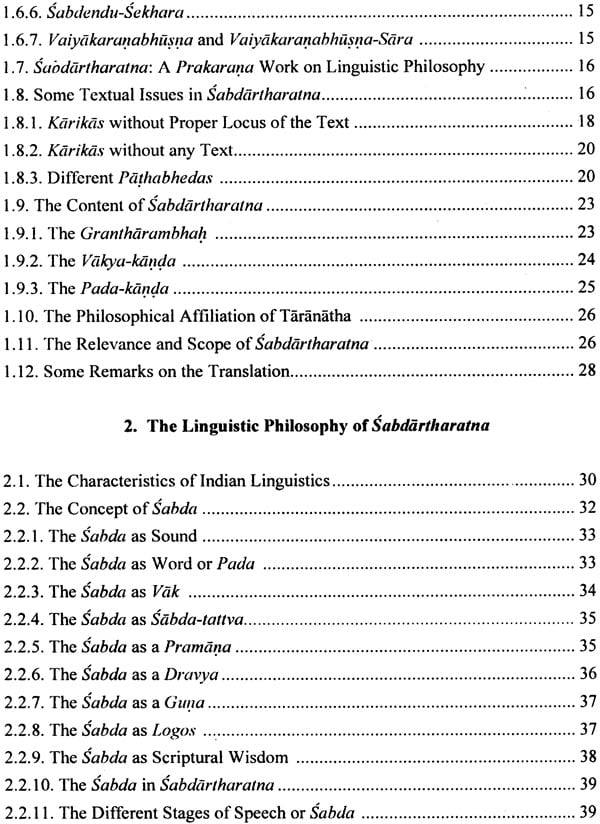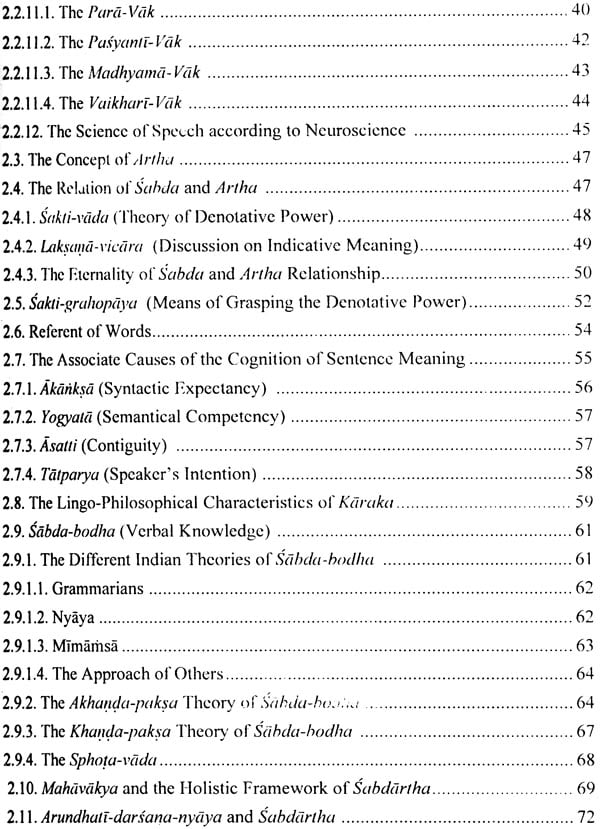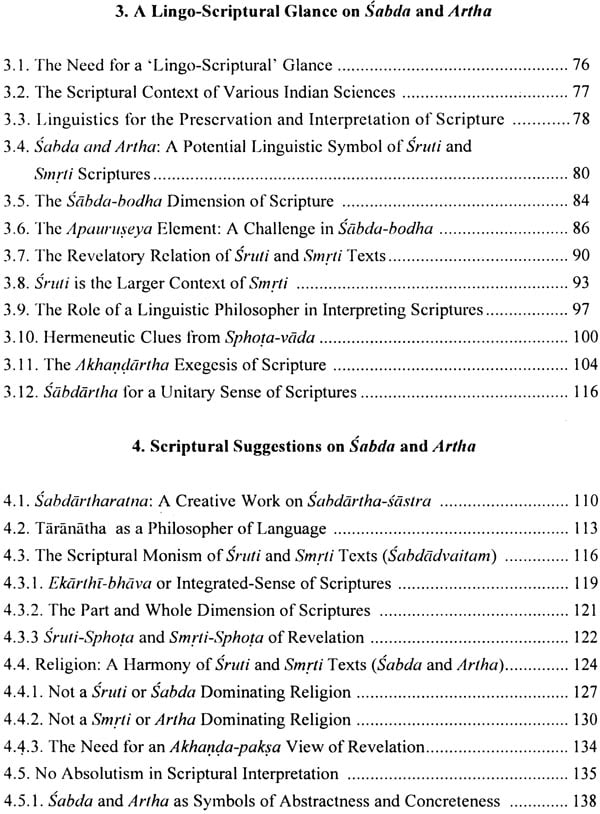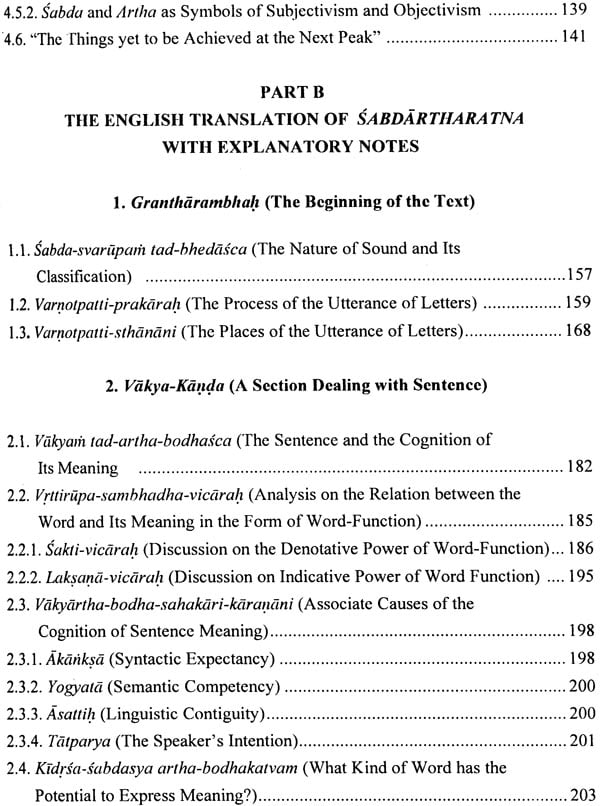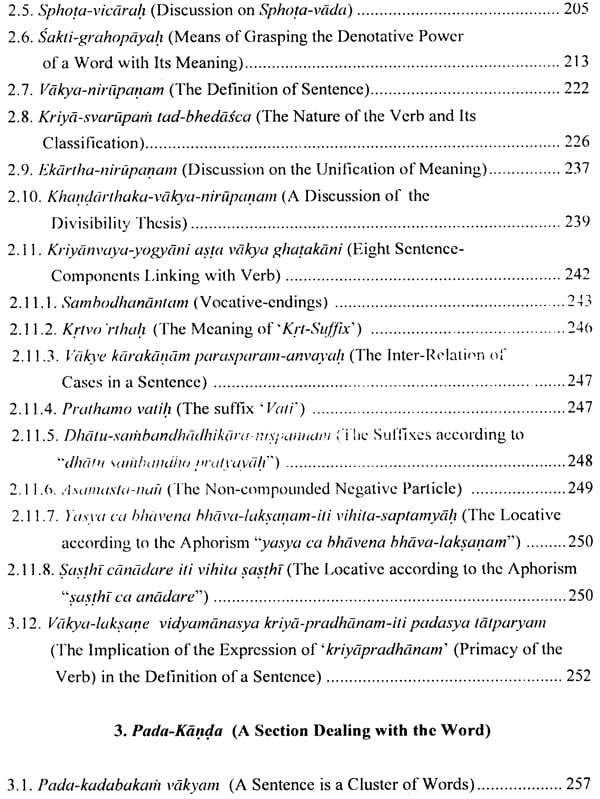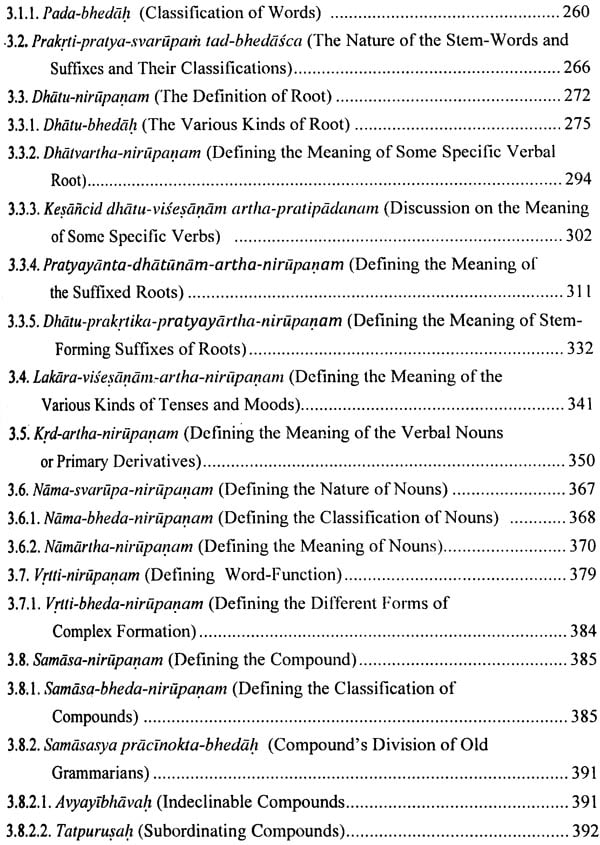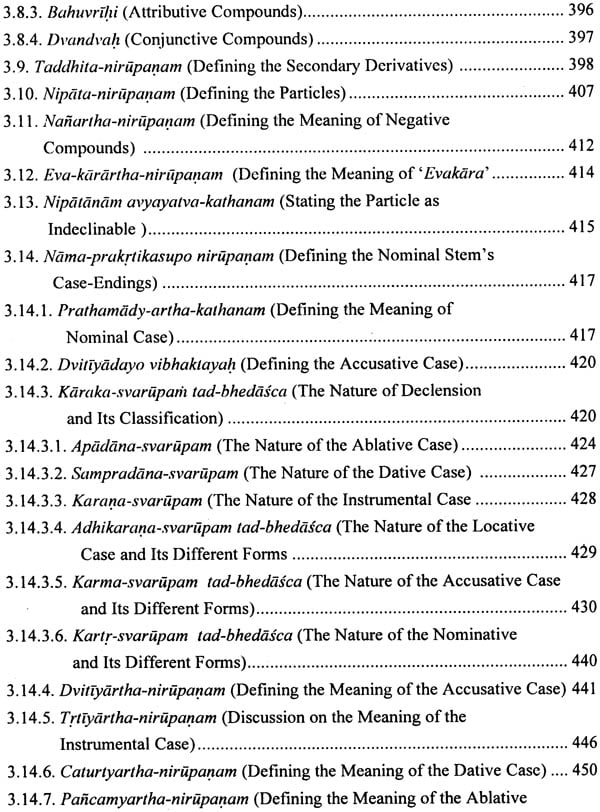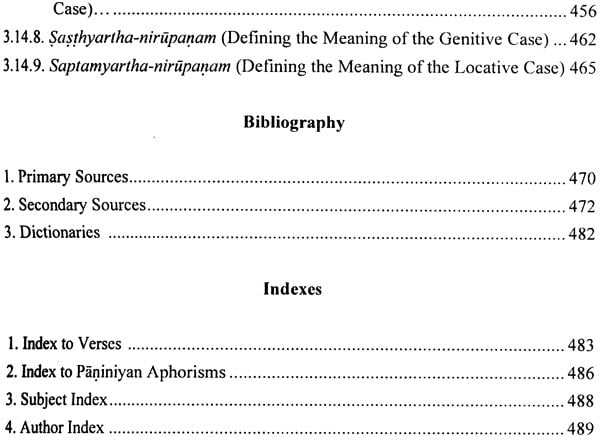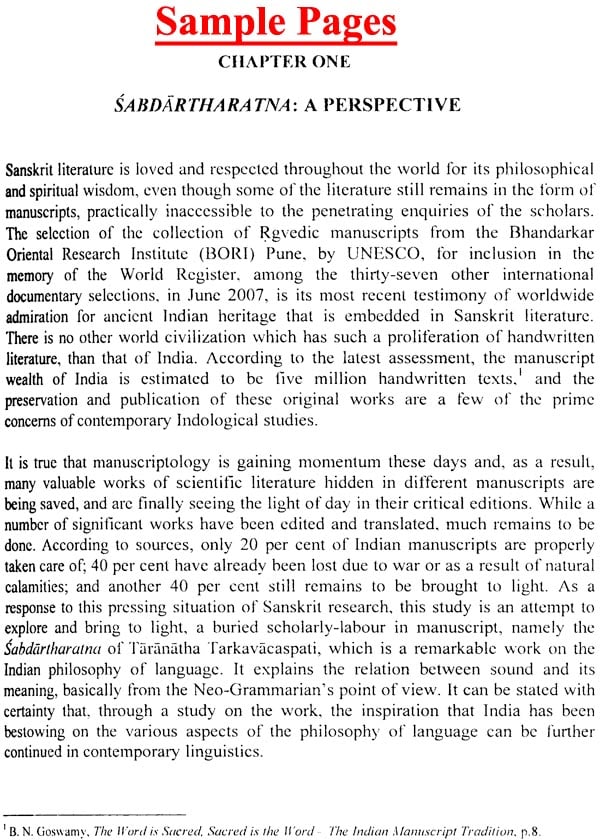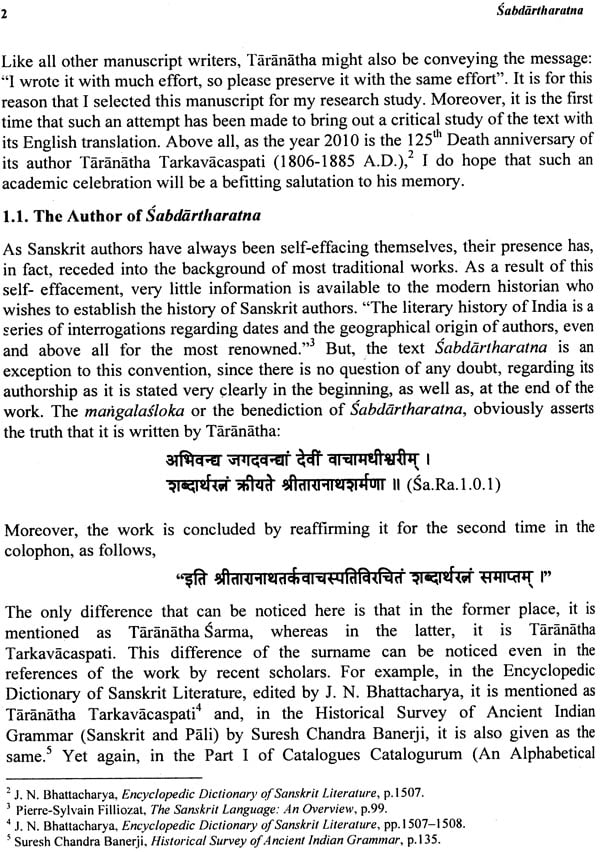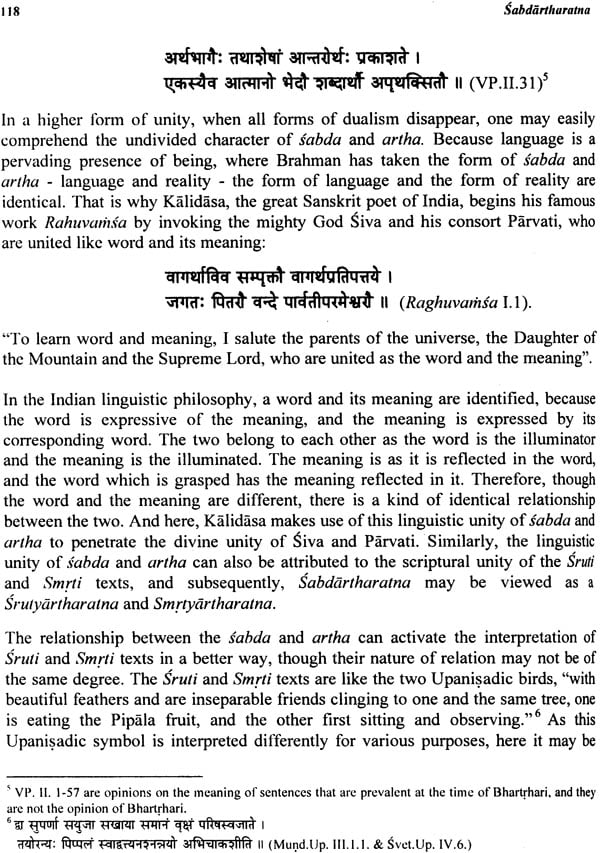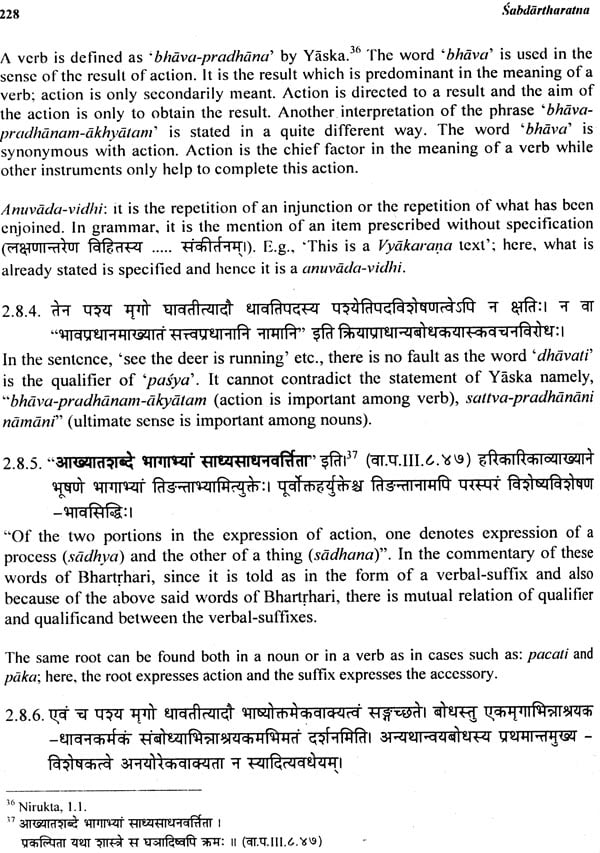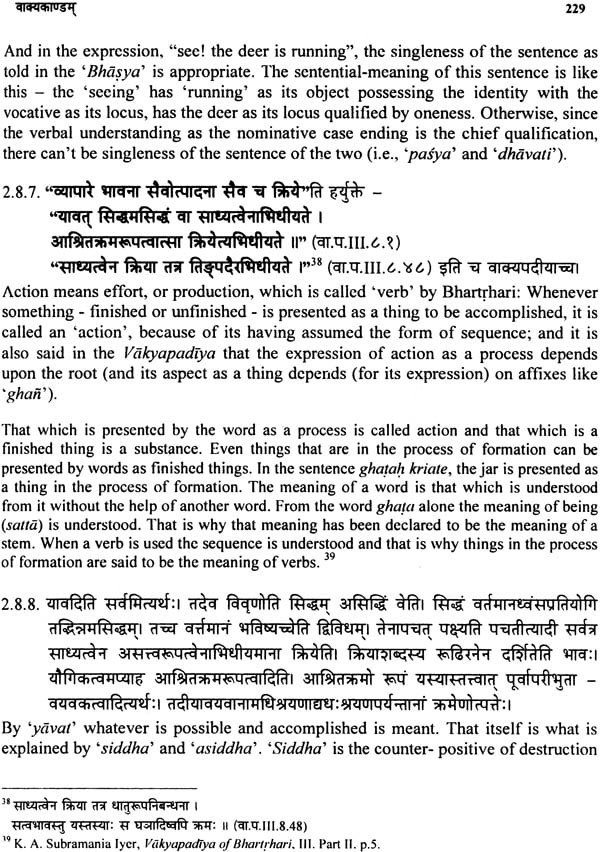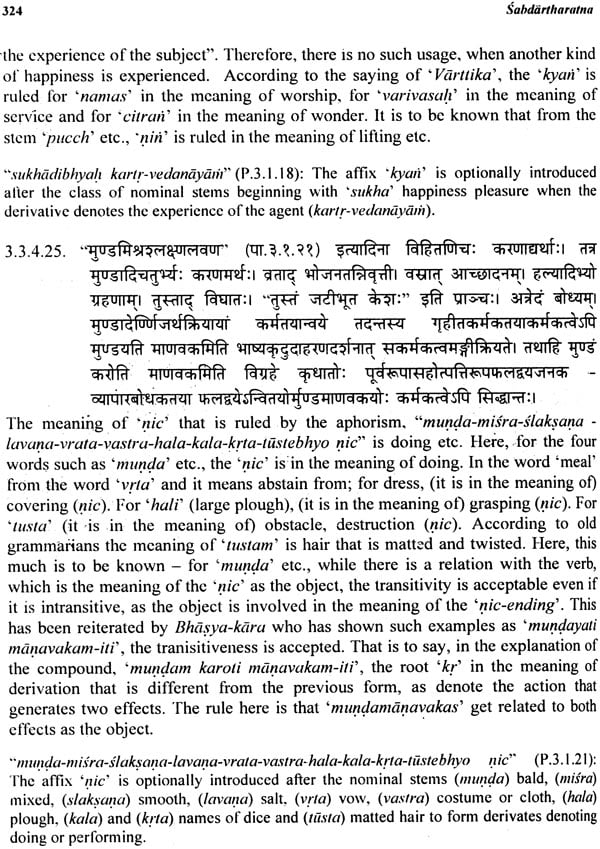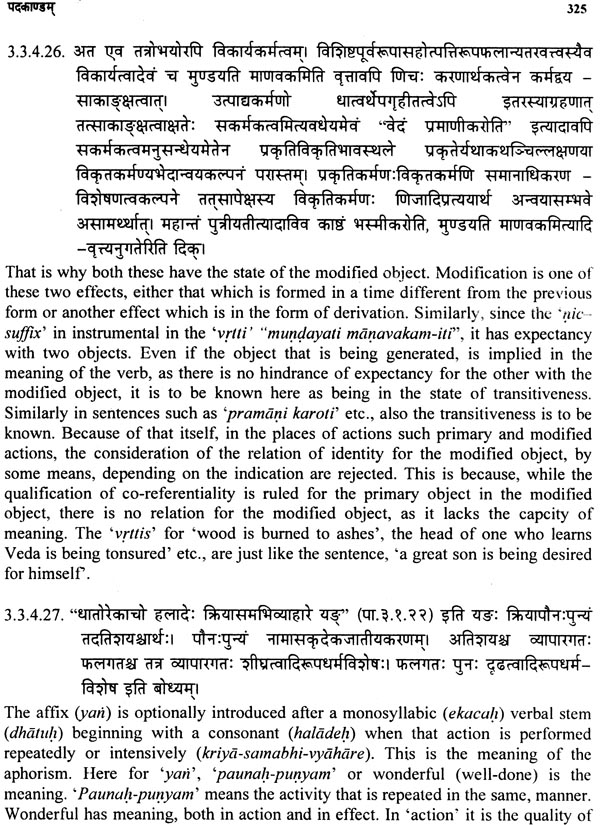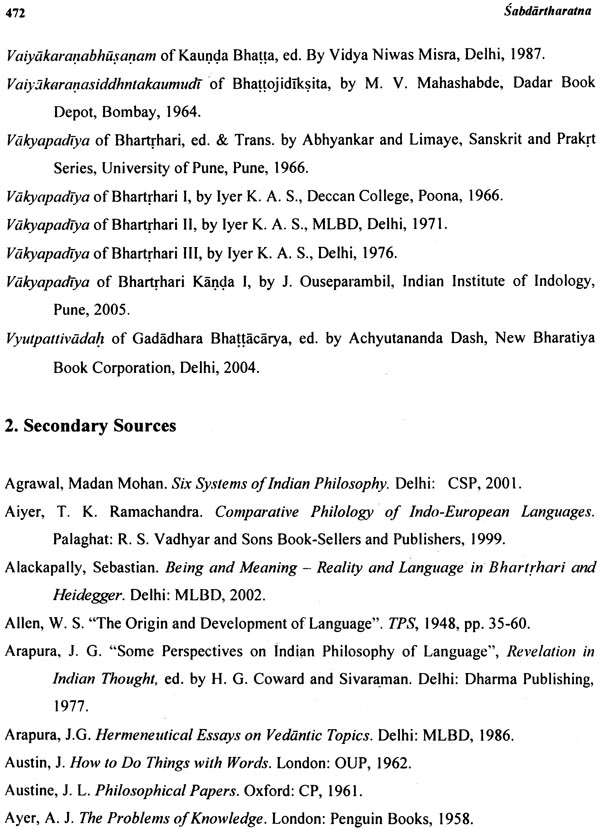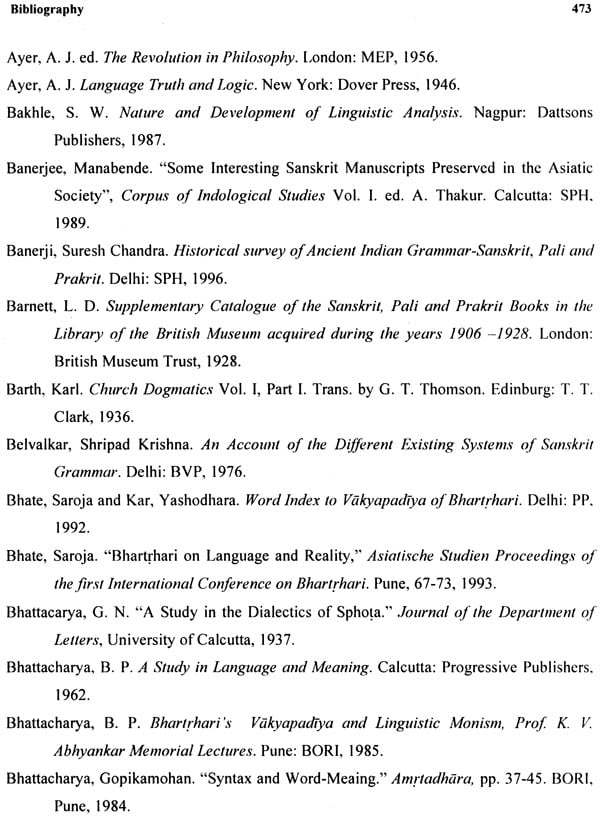
Sabdartharatna of Taranatha Tarkavacaspati (A Critical Study with English Translation)
Book Specification
| Item Code: | NAP928 |
| Author: | Jojo Parecattil CMI |
| Publisher: | Pratibha Prakashan |
| Language: | Sanskrit Text With English Translation |
| Edition: | 2013 |
| ISBN: | 9788177022667 |
| Pages: | 566 |
| Cover: | HARDCOVER |
| Other Details | 9.50 X 7.50 inch |
| Weight | 1.20 kg |
Book Description
This researchstudy on of Taranatha. Tarkavacaspati includes the criticai edition as well as an English translation of the text and a focused critical analysis of the text. Along with an introduction to the work and its author this study deals with the linguistic concept of s'abdartha. The text of the critical edition is given in final chapters and in these chapters, me text is subdivided into small units on the basis of logical division of the topic considered and each unit has been numbered separately for easy reference. For a better understanding of the text, the translation is invariably followed by explanatory notes. As the philosophic glances move from one side to the other, newer and newer relations are discovered and the 'linguistic-glance' of the Sabdartharatna (the vatheirtha elements) is turned into 'lingo-scriptural glance le vent) for fresh insights, Just as one moves from the import of words to the impori of sentences in linguistic philosophy, here the import of sentences are further moved or transcended to the import of scriptures and, thus, the language of hermeneutics is converted into a language of scripttiritual hermeneutics.
Sahdartharatna is an excellent work in the tradition of vyakaranadarsana which includes almost of the topics that are generally discussed in the field tiy. I congratulate Dr. Jojo Parecattil that he took this td made a great endeavour in studying it critically and same into English with useful notes. The language in the thesis is lucid and methodology adopted here is praiseworthy.
Prof. Ramesh Chadra Panda Dean, Faculty of Sanskrit Learning and Theology Banaras Hindu University, Varanasi 221005
Dr. Jojo Parecattil CMI, a Catholic priest belonging to the Congregation of the Carmelites of Mary Immaculate (CMI), teaches Sanskrit and Indian Philosophy in the Faculty of Philosophy, Dharmaram Vidya Kshetram, Bangalore, India. Apart from his expertise in Sanskrit language, Parecattil holds a postgraduate degree in Nyaya Philosophy from Mahatma Gandhi University, Kottayam, MPhil from Madras University, and a PhD from the University of Pune.
"In the beginning the Word already existed; the Word was with God, and the Word was God." (J n. 1: 1-3 )
"I come from a country and a civilization that gave us the Universal Word; that Word is preceded by silence, followed by more silence; that Word is Aum" These words of Resul Pookutty, while receiving the Oscar Award for best sound-mixing of the year 2008 at Los Angeles, is certainly an inspiration to contemplate and to make innovative studies on that Eternal Sound for initiating a new linguistic awareness in various fields of human life. This research study, precisely, is an attempt in this direction to unfold the sound dimension of Sanskrit linguistic philosophy with the help of an unnoticed manuscript.
Indubitably, India can be considered as the cradle of linguistic studies since the Vedic period, and there have been extensive discussions and deliberations on this particular branch of philosophy. As a result, the Sanskrit tradition does have a rich and rewarding literature in this field, and Sabdartharatna is the latest addition to this collection. This work is a study on Sanskrit linguistics, specifically on the relation between a word and its meaning, which is profound in content, simple and lucid in style and serves as a gateway for beginners. It makes a detailed discussion on the import of a word, the semantic relevance of syntactic categories such as nouns, verbs, verbal endings, conjugational endings, compounds, etc. It starts with the phonemes of Sanskrit language and then moves on to sentences and morphemes.
This research study includes two parts: The first part is a critical study about the text and the second part consists of the critical edition as well as the English translation of the text. The opening chapter of the first part introduces the work and its author by giving the significance, context and content of the text. The second chapter deals with the linguistic elements of the text and it also makes a comparative study with other schools of Indian philosophy. The third chapter deals with the scriptural signification of the linguistic concept of sabdartha and the forth chapter makes the concluding observations of the study.
In the second part, the text is divided into in three chapters and in each chapter, the passage is subdivided into small units, on the basis of the logical division of the topic considered. Each unit has been numbered separately for easy reference. For a better understanding of the text, the translation is invariably followed by explanatory notes. Finally, a select bibliography of primary sources and modem works arc appended for the benefit of further studies in the subject.
In the context of Sabdartharatna, the relation of sabda and artha is studied here, in conjunction with Sruti and Smrti texts. The concept of sabdartha is a supportive means to plunge into the depth of scriptural wisdom, and drawing insight from the essence of sabdartha, these two sacred traditions can be better understood and interpreted. अकृतकारि खल्वपि शास्त्रमग्निवात तद्धता अग्निर्य ददग्थ तत दहति which means, "The sastra fulfills, what has not been achieved earlier; for instance the fire burns only that thing which is not burnt earlier." Similarly, the researcher wishes that scholars of Sanskrit could find something new in the upcoming pages to carry forward their philosophical speculations on that Eternal Word-Principle, as it gives a scriptural dimension to the traditional view of sabdartha. With such a humble wish, I submit this study before the learned.
Dr. Jojo Parecattil eMI, the author of the present scholarly work, is a philosopher, a teacher and a spiritual seeker. He thus combines harmoniously in his person philosophy, teaching-ministry and spirituality. The subject matter of this book is a Sanskrit work entitled Sabdartharatna, written by an eminent Bengali scholar called Taranatha Tarkavacaspati (1805-1885). Taranatha Tarkavacaspati was a lexicographer, grammarian, philosopher and spiritual seeker. The meeting points of these two scholars, therefore, are in philosophy and spirituality. There is no wonder in this; it has to be like that. All the reputed scholars and writers of Sanskritic and Brahmanic tradition of the past were invariably philosophers and spiritual persons. The Upanisadic seers like Yajnavalkya, Janaka, and Gargi, the saintly sages like Vyasa, Valmiki and Manu, the speculative specialists like Kapila, Patafijali, Gautama and Kanada, the classical writers like Sankara, Kumarila Bhatta, Vacaspati Misra, Udyotakara and others, modern leaders like Aurobindo, Vivekananda and Gandhi - they were all outstanding philosophers and marvelous spiritual masters.
In India, especially in India of old, philosophy and spirituality, speculation and contemplation, logical knowledge and intuitive wisdom are all inseparably intertwined. In the West a philosopher may be considered as an outside experimenter who intellectually analyses the realities using the tools of logic, his / her power of reason and a defined cogitation process. In India philosopher is an involved experience who tries to find meaning to events and realities from the inner experience. This leads the philosopher to the vision (darsana) of Reality in its totality. Philosophy is not mere intellectual exercises geared up to enter into the intricacies of existence and phenomenal world by the power of reason, but it is a form of intellectual discipline supported and sustained by a life of spirituality. Both Taranatha Tarkavacaspati and Jojo Joseph follow this long tradition of philosopher- saints.
Taranatha Tarkavacaspati seems to have gone deep into the grammar of Sanskrit language, philosophy of language and Sanskrit lexicography. His other works like Vacaspatyam, Sabdastoma-Mahanidhi and Sarala deal with lexicography and grammar. Besides grammar, he definitely was an erudite acarya in Nyaya- Vaisesika, Mimamsa and Vedanta. But his investigative predilection seems to favour linguistic philosophy, linguistic exegesis, theories of meaning, etc. Sanskrit grammar does not consist in only declensions, conjugations, syntax, semantics, etc. It is also a philosophical discipline, leading to a philosophy of language and the unique sphota theory. Great grammarians like Panini, Patanjali, Bhartrhari, Bhattoji Diksita and others were also eminent philosophers. " Sabdartharatna. as the title signifies, deals with the relationship between words and their meanings. This issue is intensely discussed in systems like Mimamsa, Nyaya- Vaisesika and Vyakarana. Sabdartharatna has three chapters: (i) Grantharambhah, which deals with introduction; (a) Vakya-kanda, which deals with sentences, and (ai)" Pada-kanda, which deals with words. The work, as the author acknowledges, imbibes influences heavily from previous authors and scholars. Particularly, Taranatha refers to Vakyapadiya of Bhartrhari, Siddhanta- Kaumudi and Sabda-Kaustubha of Bhattoji Diksita and Laghu-Maajasa of Nagesa Bhatta.
In fact, many of the key concepts of the work like para, pasyanti, madhyama and vaikhari (in Grantharambhah); sakti, laksana, akansa, sannidhi, yogyata and tatparya (in Vakya-kanda), and prakrti-pratya-svarapam, dhatu-bhedah, samasa-nirapanam and karaka-svarapam (in Pada-kanday are all concepts and principles deliberated in detail by earlier philosophers. Still Sabdartharatna has great relevance, scope and meaning. It presents a unified vision of language, grammar and philosophy; it poignantly deliberates on linguistic philosophy and linguistic speculation. There was immense interest among scholars of Sanskritic tradition and of Indian philosophy of Bengal of nineteenth century in philosophy of language, grammar, theories of meaning, etc. These scholars and seekers of knowledge and wisdom felt that their erudition and enlightenment need to be enhanced and perfected through a work of the caliber of Sabdartharama. If Taranatha Tarkavacaspati did not write this work, as the present author seems to say, somebody else would have written a work of this type. Sabddrtharatna was definitely eminently fulfilling an urgent and dire need of the time.
Dr. Jojo has also done a great service. By rendering the work into English, he laid open the precious treasures of this great work to an immensely wider readership and study circles. This is the first English translation of Sabdartharatna. Dr. Jojo's work entitled Sabdartharatna of Taranatha Tarkavacaspati: A Critical Study with English Translation has two parts. Very elaborate and erudite critical study is given in the first part in four chapters. It employs analytical-historical methodology and systematic-scientific tools of investigation. It is, I would say, a 'must-read' text for all students of philosophy of language and Sanskritic linguistics. The second part of the work gives the annotated translation of Sabdartharatna in three chapters corresponding to the chapters of the original text. Kavit: kranta-darsih, goes the saying, meaning a poet is one who sees beyond and behind the objects of experiences. We, normal mortals, see material objects, persons and events as they are presented to us through our senses and mind in their actual materiality, measurability and dimensionality. But poetical mind transcends these and enters behind the presented objects and captures extra details, intense sentiments and new meanings of these things and experiences. Here the poet is on par with the sages and mystics of old, the Rsis; Rsis are also kranta- darsis. Philosophers are also kranta-darsis. While the mystics become transcendental supra-natural seers through the sublimation of the spirit and power of Yoga, and the poets become supra normal visionaries through the power of imagination, poetical intuition and connatural talents, the philosophers become kranta-darsis through the power of reason, logical reflection and arguments. They find new meanings, insights and views about life, expressions and experiences of life, in the phenomenal world and about the supra-mundane realms of existence. This is what our philosophers here, that is, Taranatha and Jojo, are doing. They have added new and original contributions to the reservoir of knowledge of humanity, and are inviting us to imbibe inspiration and enlightenment from their findings.
A work, be it literary, artistic or philosophical, is a powerful and creative expression of the individuality and personality of the author, a projection of his/her self. Individuality of the work would inevitably lead us to the individuality of the creator. Sabdartharatna of Taranatha Tarkavacaspati: A Critical Study with English Translation of Dr. Jojo is a massive work. It contains historical investigations, literary criticism, scriptural exegesis, philosophical deliberations, comparative study of texts, translation of texts and textual analysis; it also harmoniously blends the linguistic reflections with scriptural texts. Needless to say that much reading, study, discussion and reflection have gone into the making of this work. There definitely had been intense, passionate and continuous exercise of sravana, manana and nididhyasana. One needs the yogic mind, which can only engage in such an uninterrupted tapasya for the successful completion of such an erudite and deeply philosophical work. These all lead us to the author who is endowed with immense patience, steadfast perseverance, purposeful determination, astute acumen, love of wisdom and wisdom of love.
